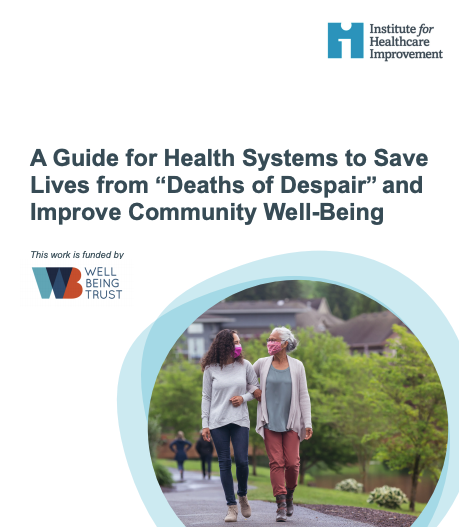Health systems’ vital role as community leaders has never been clearer, nor more essential
As the COVID-19 pandemic continues to take lives and trigger economic and social dislocation, and the nation’s need to reckon with racial justice could not be clearer – the healthcare sectors’ leadership role in preventing deaths of despair is paramount. It is especially vital that the sector address rising rates of suicide and addiction among caregivers and first responders; as well as to engage more fully in implementing solutions for communities, especially with people of color, who are dying from the virus at four times the rate of the general population.
Despite heroic efforts, the events of this year have unmasked pervasive systems failure and inequities in ensuring equitable access to affordable mental health and addiction care. Previously high demand for mental health and addiction care is continuing to rise given rising levels of despair triggered by layered biologic, economic, social, environmental and political crises.
Healthcare system and hospitals can play an ever-more effective role in improving community outcomes. By leading with clinical offerings, while leveraging all their assets as anchor institutions, partnering outside their walls, and transforming systems of prevention to better promote health and well-being in the first place — healthcare systems are essential to help drive population-level results.
At Well Being Trust, our mission is to create a nation where all people and places thrive. In doing so, we set a goal of saving 100,000 lives from deaths of despair, while measurably improving the well-being of the American people over the next 10 years. Working alongside the Institute for Healthcare Improvement and Providence Health, we’ve developed a guide with a set of pragmatic, evidence-based recommendations for health care systems seeking ways go beyond doing good things, to becoming accountable for improving health and well-being outcomes in their communities.
The recommendations place community at the center and lift up leveraged ways that the healthcare sector can partner in making ‘dose-sufficient’ investments for life saving, sustainable results. The value of equity, human flourishing and addressing the vital conditions for community well-being provides a foundation for action.
The new guide — “A Guide for Health Systems to Save Lives from “Deaths of Despair” and Improve Community Well-Being“— is a call to action and trusted resource for health system leaders.
Regardless of which population you prioritize or where you begin with this process, here are four suggestions for incremental improvements that can help create lasting, system-level change:
- Contribute to an environment that promotes flourishing. There’s more to promoting health than doctors’ visits. We must transform the environments where people live, learn, work, play and pray — and that requires structural changes to provide everyone with the vital conditions for well-being. Removing the stigma around mental health and substance misuse promotes healthy behavior change and promoting equity within communities, and in health care delivery brings access to care to more who need it.
For example, the Foundation for Healthy Communities is a group of New Hampshire hospitals that engage in innovative partnerships to improve health and health care across the state, addressing quality of care, access to care, and community health improvement. Since 2017, the foundation has focused on improving the health and well-being of New Hampshire residents by fostering connections between health care, public health, and the social determinants of health while advancing health equity.
- Focus on prevention and recovery. Strong prevention strategies focus on relationships that can support care during treatment and recovery. Social connections and interpersonal relationships can help prevent relapse and can be a salve for those who are suffering to prevent them turning to unhealthy coping mechanisms in the first place. While relationships may seem like a personal issue, there are actually things health systems can do to support social connectedness, like hosting peer-to-peer dialogues or sponsoring community-based ways to care for each other like Friendship Benches.
Take Making Connections, for example. This national initiative works with 13 urban, rural, and suburban communities to implement prevention strategies to improve mental health and well-being for veterans, young men, and boys of color. In New Orleans, they have played an important role in the response to community trauma, shifting the focus from young men and boys’ deficits to community strengths that lift young people up and contribute to community-level well-being.
- Create reliable processes and systems for early identification. Screening for depression, substance use disorder, and suicide in both clinical settings and through community partners is critical to catch potential issues early. There’s good evidence that early identification can improve outcomes for those who are suffering.
The Christiana Care primary care program in Delaware has integrated behavioral health, permitting a behavioral health specialist to see a patient within their primary care visit and avoid the risk of the patient not following through on a separate appointment with the specialist. This integrated approach to care has expanded to cancer, pediatric, cardiac, and intensive care units across the health system.
- Health systems and communities can come together to rethink how and where treatment occurs. Telehealth has boomed during the pandemic, and it will continue to be a key way health systems can expand patients’ access to services and coordinate care and referrals within and outside of health care, such as community centers and police departments, through community partnerships.
For example, in the midst of the pandemic Cabin Creek Health System in West Virginia transitioned to telehealth group therapy for patients on medications for opioid use disorder. Staff considered some of the obstacles of virtual appointments — not all patients have access to technology or good bandwidth; confidentiality of the group might be harder to maintain — when creating norms for productive virtual group treatment and therapy sessions. Patients advocated for virtual group visits so they could keep getting peer support and stay in touch with other patients.
Summary
Systemic transformation does not happen overnight. By building and making good use of local partnerships and committing to long-term improvements, health care systems can leverage all they are to create meaningful change that will improve population health and equity for their communities in the years to come.
Tyler Norris, MDiv is CEO, Well Being Trust, an executive at Providence, and civic leader with four decades lived experience serving in over 500 US communities.






